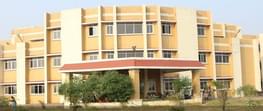Dr. K. Kishore Kumar is the Dean of Academics and a Professor in the Department of Electronics and Communication Engineering at ICFAI University, Raipur. Prior to the present role, he was associated with the ICFAI Foundation for Higher Education (IFHE), Hyderabad, as Associate Dean-Academics, Chairperson of Academic Instruction, and Head of the ECE Department. He holds a B.Tech. degree in Electronics and Communication Engineering, an M.Tech. degree in Digital Systems and Computer Electronics and a PhD degree in Electronics and Communication Engineering.
A motivating faculty member and Academic Administrator, Dr. Kumar enjoys inspiring students and faculty to have academic and personal excellence. He has several years of experience working in the academia, and private sectors in research, teaching, consulting, project management, and product engineering roles. His current research interests include Machine and Deep Learning, Human Computer Interaction, Wireless Sensor Networks, Internet of Things (IoT) and Learning Systems, and algorithm design for emerging communication networks. He has published research papers in SCI, SCIE, and Scopus listed journals and presented papers at renowned conferences. Moreover, he is a Senior Member of IEEE (USA), a Fellow of the Institute of Engineers (India), and a Fellow of IETE (India). He is also a reviewer of several international journals and conference proceedings.

In your 21+ Years of academic experience, You might have seen many institutions, what is something about ICFAI that excited you to join the organization and be apart of it?
The educational process at ICFAI is embedded with several academic flexibilities to ensure a learner-centric approach. Within the same tier, Academic Freedom to the Students, Choice Based Credit System, Audit Courses, Optional Electives, Departure from Normal Pace and other flexibilities account for an enriching and gratifying erudite experience at ICFAI. Our innovative and interdisciplinary educational approach is bolstered by an integrated and broad-based curriculum. At ICFAI, a choice-based credit system is prevalent to enrich the curriculum that is restructured frequently to meet the requirements of industry and academia. This enables the students to opt for interdisciplinary courses from a pool of available open electives, apart from core courses.
Our curriculum is built upon a strong foundation that also incorporates the latest techniques and technologies to prepare our students for the global market. Enabling students to connect ideas and concepts across different disciplinary boundaries expands their learning experience. The interdisciplinary curriculum allows students to build their own pathway by choosing thematic courses that cross over the disciplinary boundaries of engineering and science. The Internship Program is a unique and integral part of the undergraduate and postgraduate degree programs offered by ICFAI. The real-time work experience prepares the students to confront diverse challenges in their professional lives. Furthermore, the faculty members of ICFAI supervise, evaluate, and grade the students in consultation with the industry mentors.
How do you balance the academic needs of students, and administration at the same time as a Dean of Academics?
Balancing the academic needs of students and administrative responsibilities as a Dean of Academics is a complex and challenging task. Here are some strategies and principles that we adopt to achieve this balance. Keeping the students' academic needs and well-being at the forefront of our decision-making process. Understanding their concerns, listening to their feedback, and addressing their academic challenges promptly. As a Dean, it's essential to delegate tasks efficiently. Building a capable administrative team and empowering them to handle routine administrative tasks will allow us to focus more on academic matters. Setting aside specific blocks of time for tasks such as curriculum development, faculty support, and student engagement is essential, along with working closely with faculty members to ensure they have the resources and support needed to provide quality education. Developing a strategic plan for the academic department that aligns with the institution's goals is important. We are continuously evaluating and streamlining administrative processes to reduce redundancy and inefficiency.
What kind of steps you take to ensure that the curriculum and academic pedagogy stays updated and current with the latest trends?
To ensure that the curriculum and academic pedagogy remain current and aligned with the latest trends, several steps are taken. Periodic assessments and reviews of the curriculum are essential. This includes evaluating course content, learning objectives, and assessment methods to identify areas for improvement. We establish partnerships with industry professionals and organisations to gain insights into emerging trends and skills needed in the job market through guest speakers and internships. We encourage faculty members to engage in continuous professional development. Support them in attending conferences, workshops, and training sessions to stay updated on the latest teaching methods and subject matter expertise. We collect feedback from students, alumni, and faculty about their experiences with the curriculum. Use this feedback to make the necessary adjustments and improvements. We design the curriculum with the flexibility to incorporate changes as needed without major disruptions. Moreover, we leverage digital tools and online resources to adapt to changing trends and deliver up-to-date content. We compare the institution's curriculum with that of peer institutions and benchmark it against industry standards to identify gaps and opportunities for improvement.
What are the steps that ICFAI Raipur takes in order to providing experiential learning to the students?
ICFAI University, Raipur, strives to provide experiential learning to students through several key steps. We collaborate with local industries and organisations to offer internships, projects, and real-world exposure to students. We arrange for guest lectures and workshops conducted by industry experts, allowing students to gain insights and practical knowledge. Incorporating real-life case studies into the curriculum enables students to apply theoretical concepts to practical situations. Organising field visits to relevant industries and sites to give students firsthand experience and exposure. Encouraging students to engage in research projects and academic initiatives that address real-world problems. Providing support for entrepreneurship initiatives and start-up incubation helps foster practical business skills. We also offer skill development programs and certifications to enhance students' employability. Through these measures, ICFAI Raipur aims to ensure that students gain practical experience and are well-prepared for the challenges of the professional world.
Check ICFAI University, Raipur Courses & Fees
Can you describe what is the challenging part of being in a Dean of academics role, and how you successfully manage it?
The challenging part of being in a Dean of Academics role is balancing the diverse demands of faculty, students, curriculum development, and administrative tasks while maintaining academic quality and institutional goals. Successful management involves effective delegation to trusted faculty and staff, setting clear priorities, and fostering a culture of collaboration and innovation. Regular communication with stakeholders, embracing technology, and staying updated on educational trends are essential. Additionally, adaptability and resilience are key, as the academic landscape is constantly evolving. By employing these strategies and maintaining a student-centric focus, the role's challenges can be navigated effectively while achieving academic excellence.
How do you leverage the use of technology for the teaching methods to give effective learning experiences to the students at ICFAI Raipur?
At ICFAI Raipur, we leverage technology to enhance teaching methods and provide effective learning experiences. We integrate Student Information Systems (SIS), online resources, and virtual classrooms to facilitate anytime, anywhere learning. Additionally, we employ multimedia content, interactive simulations, and e-assessments to engage students and cater to various learning styles. Furthermore, we encourage faculty to stay updated on tech-driven pedagogical innovations and offer training opportunities. Through these measures, we create a blended learning environment that combines traditional teaching with digital tools, ensuring that students receive a dynamic, interactive, and up-to-date educational experience that prepares them for the demands of the modern world.
What kind of initiatives have been implemented for encouraging the students to involve in extra curricular activities outside the classroom?
The university has various student-led clubs and societies focusing on diverse interests such as sports, cultural activities, entrepreneurship, and social causes. These provide students with opportunities to pursue their passions and develop leadership skills. We regularly organise inter-college and intra-college events, competitions, and fests through sports tournaments, cultural festivals, hackathons, and business plan competitions, motivating students to participate and showcase their talents. Inviting guest speakers and industry experts for talks, seminars, and workshops exposes students to real-world insights and networking opportunities. Empowering students by establishing a student council that plays a pivotal role in organising extracurricular activities, representing student interests, and fostering leadership. We aim to provide state-of-the-art sports facilities and encourage participation in various sports and games. The administration looks into promoting cultural exchanges and diversity by hosting cultural nights, international student interactions, and exchange programs. Establishing innovation hubs or maker spaces where students can explore creative and technological pursuits.
What is your vision for the coming years as a Dean Academics for the institution?
As the Dean of Academics for ICFAI University Raipur, my vision for the coming years is to propel the institution to new heights of academic excellence and holistic student development. We will continually evolve our teaching methods, embracing technology and experiential learning, to ensure our graduates are well-equipped for the rapidly changing global landscape. I aim to foster a robust research culture, encouraging faculty and students to engage in cutting-edge research that addresses real-world challenges. Our institution will prioritise inclusivity, diversity, and social responsibility, ensuring that all students have equal opportunities and contribute positively to society. We aspire to promote global perspectives, facilitate international collaborations, and offer opportunities for cross-cultural learning. Our focus will remain on student welfare, providing a supportive and enriching educational experience that goes beyond the classroom.


.png?h=132&w=263&mode=stretch)
.png?h=132&w=263&mode=stretch)
.jpeg?h=132&w=263&mode=stretch)



.png?h=78&w=78&mode=stretch)
.png?h=78&w=78&mode=stretch)

.jpeg?h=78&w=78&mode=stretch)
![Pt. Ravishankar Shukla University - [PRSU]](https://image-static.collegedunia.com/public/college_data/images/appImage/25443_coverpage.jpg?h=111.44&w=263&mode=stretch)



![AAFT University of Media and Arts - [AAFT]](https://image-static.collegedunia.com/public/college_data/images/appImage/1683721399builingaaftrpr.jpeg?h=111.44&w=263&mode=stretch)





![Chhattisgarh University - [CGU]](https://image-static.collegedunia.com/public/college_data/images/appImage/undefined?h=111.44&w=263&mode=stretch)














![ICFAI Business School - [IBS]](https://image-static.collegedunia.com/public/college_data/images/logos/1569392159IBSLogowithR1.jpg?h=72&w=72&mode=stretch)









.png?h=72&w=72&mode=stretch)
.png?h=72&w=72&mode=stretch)
.jpeg?h=72&w=72&mode=stretch)
.jpeg?h=72&w=72&mode=stretch)
![KD Rungta College of Science And Technology - [KDRCST]](https://image-static.collegedunia.com/public/college_data/images/logos/1592913631LogoBlue140x140.jpg?h=72&w=72&mode=stretch)





![Shri Rawatpura Sarkar University - [SRU]](https://image-static.collegedunia.com/public/college_data/images/logos/1557378316logo.png?h=72&w=72&mode=stretch)

![AAFT University of Media and Arts - [AAFT]](https://image-static.collegedunia.com/public/college_data/images/logos/1557833157AAFTlogo.jpg?h=72&w=72&mode=stretch)
![Pt. Ravishankar Shukla University - [PRSU]](https://image-static.collegedunia.com/public/college_data/images/logos/1464265133logo.jpg?h=72&w=72&mode=stretch)


![Maharaja Agrasen International College - [MAIC]](https://image-static.collegedunia.com/public/college_data/images/logos/1673250065Untitled.png?h=72&w=72&mode=stretch)


![Shri Shankaracharya Institute of Professional Management and Technology - [SSIPMT]](https://image-static.collegedunia.com/public/college_data/images/logos/164638347814225442491856619023671556268294n.jpg?h=72&w=72&mode=stretch)



Comments